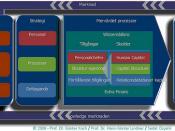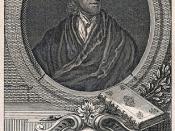It is said that one learns something new each day. At a young age one learns the basics of mathematics, speaking, writing etc. Nevertheless, how does one learn what a tree is, what it looks like, the color, smell, shape? One might learn that a tree is part of the Spermatophyte division, or that I its leaves are green and contain chlorophyll and even that paper can be made from it, but how does one know? One can touch the bark, see the leaves in the wind and even read about other's experiences with trees, therefore leaving knowledge that it is a tree. However, John Locke has much to add to this notion. Although it may be evident that the perceptual knowledge of external objects can be gained by the senses, John Locke argues that ones ideas are actually the objects of perception.
John Locke thinks that we get knowledge of physical bodies by ideas.
He classifies ideas into two basic types: simple and complex. Complex ideas are built from simple ideas. All knowledge, therefore, traces back to simple ideas, and simple ideas come exclusively through experience. Furthermore, Locke claims that we can break all of our experiences down into their fundamental parts. If we see a cat, for instance, we can break that sensation down into blackness, softness, shininess, a certain size, a certain shape, etc. Fundamental bits, those that are "uncompounded, without parts," and cannot be broken down any further, are simple ideas. Moreover, there are only two ways that a simple idea can find its way into a human mind: through sensation, or by reflection. In sensation the mind turns outward to the world and receives ideas through the faculties of sight, hearing, touch, smell, and taste. In reflection the mind turns toward its own operations, receiving...


